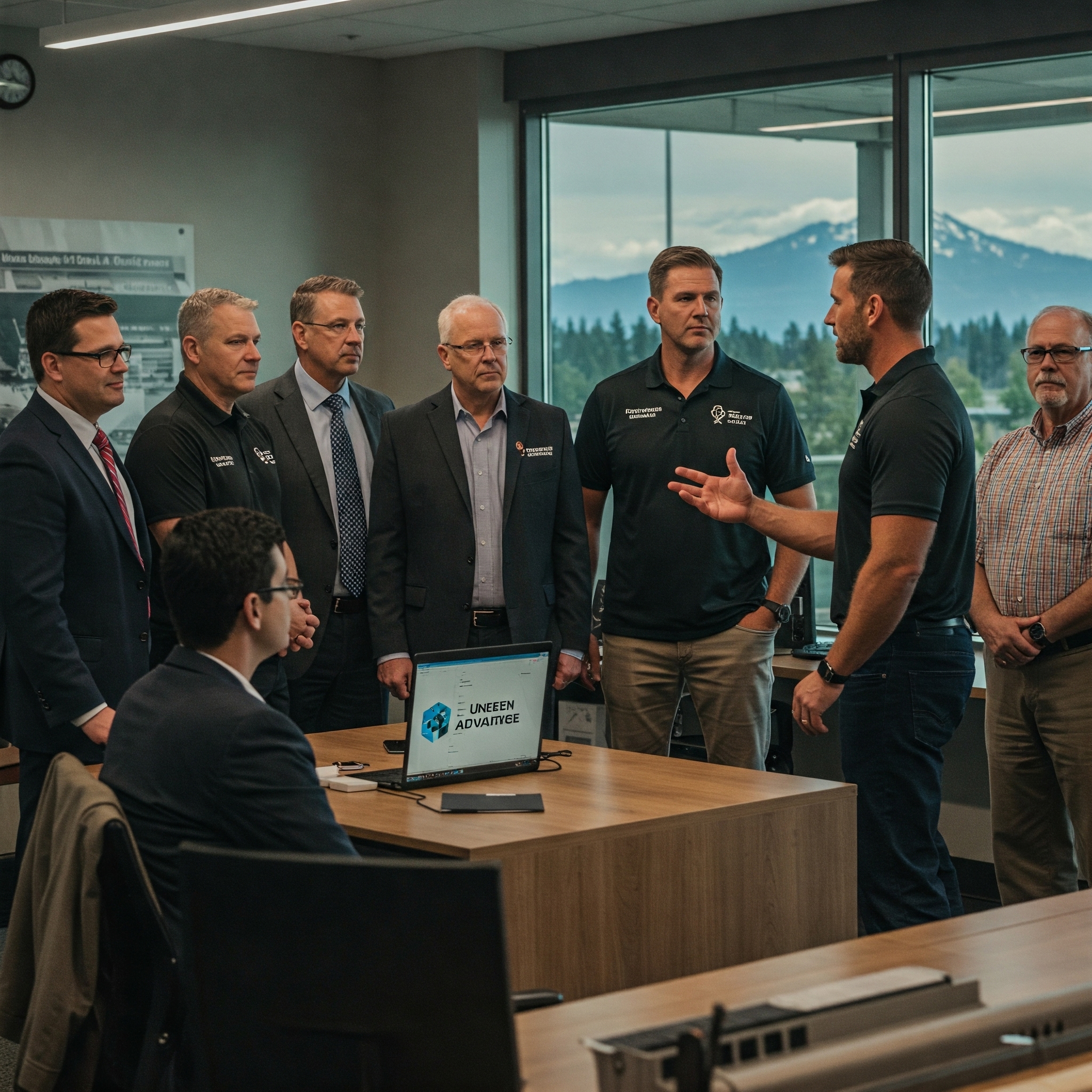For leaders of small to medium-sized enterprises (SMBs), exploring AI for SMB internal efficiency in Portland can unlock significant, often overlooked, advantages. As a Business Transformation Strategist working extensively within the Portland Metro Area, I’ve seen the buzz around Artificial Intelligence. While many discussions focus on customer-facing AI – valuable tools like chatbots or personalized marketing – the truly profound, bottom-line impacts for many established businesses lie hidden, deep within their internal operations.
For established SMBs in sectors like manufacturing, distribution, and construction, the strategic, internal application of AI represents a powerful, yet frequently overlooked, lever for enhancing profitability and building operational resilience. It’s not about chasing the latest tech trend; it’s about a meticulous, analytical approach to integrating proven technologies where they can deliver the most significant, measurable results. This means starting with sound, established management methodologies and using AI as a potent amplifier.
Many Portland business owners and executives I speak with, typically leading companies with 20 to 250 employees and revenues between $1M and $100M, are deeply invested in their operational efficiency. They understand the fundamentals. My message today is that the AI advantage isn’t just for the tech giants; it’s accessible and transformative for your business, right here in our community, when applied strategically to the core of how you work.
The Foundation: Proven Methodologies Still Reign Supreme
Before we dive into how AI can be a game-changer, it’s crucial to acknowledge that no technology, however advanced, can fix a fundamentally flawed process or a lack of strategic clarity. The bedrock of any high-performing business lies in proven management principles:
- Lean Principles: Focused on relentlessly eliminating waste (of time, materials, effort) to maximize value.
- Process Optimization: Systematically analyzing and improving workflows for greater efficiency and effectiveness.
- Strategic Planning Frameworks: Ensuring that all activities align with overarching business goals.
- Quality Management Systems: Embedding practices that ensure consistent quality and reduce costly errors.
These methodologies provide the essential framework. AI then acts as a powerful catalyst, enhancing and accelerating the benefits these principles deliver. It’s about making good businesses even better, faster, and more data-driven.
Unlocking Internal Efficiencies: AI in Action for Portland SMBs
Let’s move beyond theory. How can strategically implemented internal AI translate into measurable cost savings, reduced errors, or faster project completion for businesses like yours in the Portland area?
1. For Manufacturing Firms: Precision, Prediction, and Profitability
Portland’s manufacturing sector is diverse and vital. Whether you’re in advanced manufacturing, food processing, or apparel, the pressures of cost control, quality assurance, and on-time delivery are constant.
- The Challenge: Unexpected equipment downtime, high material scrap rates, inconsistent product quality, and complex production scheduling.
- Traditional Approach: Regular maintenance schedules, manual quality checks, experience-based production planning.
- The AI Amplification:
- Predictive Maintenance: Imagine sensors on your critical machinery feeding data to an AI system. This system learns the normal operating parameters and can predict potential failures before they happen. Instead of costly reactive repairs and unplanned downtime, you move to proactive, scheduled maintenance. The ROI: Significant reduction in downtime (often 20-30%), extended equipment lifespan, and lower maintenance costs.
- AI-Powered Quality Control: Vision systems equipped with AI can inspect products on the line with speed and accuracy far exceeding human capability, identifying minute defects invisible to the naked eye. This reduces rework, scrap, and the risk of defective products reaching customers. The ROI: Lower defect rates, reduced waste, and enhanced brand reputation for quality.
- Optimized Production Scheduling: AI algorithms can analyze vast amounts of data (orders, material availability, machine capacity, labor) to create optimal production schedules in real-time, adapting to changes dynamically. The ROI: Improved throughput, reduced lead times, and better resource utilization.
I’ve seen Portland manufacturers achieve remarkable results by first streamlining their shop floor processes using lean principles and then strategically deploying AI to automate inspection or predict maintenance needs. The technology doesn’t replace the methodology; it supercharges it.
2. For Family-Run Distribution Companies: Smarter Logistics, Tighter Control
Distribution businesses, often family-owned and deeply rooted in our community, are the lifeblood of the regional economy. Managing inventory, optimizing warehouse operations, and ensuring efficient delivery routes are paramount.
- The Challenge: Balancing inventory (avoiding stockouts vs. costly overstock), inefficient warehouse layouts leading to slow picking and packing, suboptimal delivery routes wasting fuel and time, and order fulfillment errors.
- Traditional Approach: Periodic inventory counts, manual warehouse organization, static delivery routes planned with mapping software.
- The AI Amplification:
- Intelligent Demand Forecasting & Inventory Optimization: AI can analyze historical sales data, seasonality, market trends, and even external factors (like local events or weather forecasts for Portland) to predict demand with much greater accuracy. This allows for optimized inventory levels, minimizing holding costs while ensuring product availability. The ROI: Reduced inventory holding costs (often 10-25%), fewer lost sales due to stockouts, and improved cash flow.
- AI in the Warehouse: For larger operations, AI can optimize warehouse layouts and guide pickers via the most efficient routes. Automated guided vehicles (AGVs) or robotic process automation (RPA) for order entry can further streamline operations. The ROI: Faster order fulfillment, reduced labor costs per order, and improved accuracy.
- Dynamic Route Optimization: AI algorithms can calculate the most efficient delivery routes in real-time, considering traffic patterns (a real factor in the Portland metro!), delivery windows, and even vehicle capacity. The ROI: Significant fuel savings, reduced mileage and vehicle wear-and-tear, and more deliveries per day.
The key here is not just adopting a new piece of software, but re-evaluating your entire fulfillment process with a lean mindset, then identifying where AI can intelligently automate decisions or optimize complex variables.
3. For Construction Businesses: Building Efficiency and Predictability
The construction industry in the Portland area is dynamic, but it also faces persistent challenges around project timelines, budget adherence, and safety.
- The Challenge: Project delays due to unforeseen issues, cost overruns from inefficient resource allocation or material waste, ensuring on-site safety, and managing complex project schedules.
- Traditional Approach: Experienced project managers, manual scheduling tools (like Gantt charts), and standard safety protocols.
- The AI Amplification:
- AI-Driven Project Risk Analysis: By analyzing historical project data, current site conditions, and even weather patterns, AI can identify potential risks and bottlenecks before they derail a project. This allows for proactive interventions. The ROI: More predictable project timelines, reduced likelihood of costly delays, and improved client satisfaction.
- Optimized Resource Allocation: AI can help in scheduling and allocating labor, equipment, and materials more effectively across multiple job sites, ensuring resources are where they’re needed, when they’re needed. The ROI: Reduced idle time for equipment and crews, minimized material waste, and lower project costs.
- Enhanced Safety Monitoring: AI-powered systems can analyze video feeds from job sites to identify unsafe practices or conditions in real-time, alerting safety managers to potential hazards. The ROI: Improved worker safety, reduced incidents and associated costs (insurance, lost time), and a stronger safety culture.
- Generative Design for Optimization: In the planning phase, AI can help architects and engineers explore numerous design options quickly, optimizing for factors like material usage, energy efficiency, or structural integrity, based on defined parameters. The ROI: Potential for more innovative, cost-effective, and sustainable building designs.
For construction firms, a strategic approach means integrating these AI tools into a well-defined project management framework, enhancing the ability of your experienced teams to deliver projects on time and on budget.
The Strategic Imperative: Moving Beyond Hype to Tangible ROI
Adopting AI internally isn’t about implementing technology for technology’s sake. For businesses serious about leveraging AI for SMB internal efficiency in Portland, it must be a strategic decision driven by clear business objectives and a focus on measurable return on investment. The beauty of focusing on internal processes is that the impact – cost savings, error reduction, speed improvements – can often be quantified directly on your P&L statement.
As a Business Transformation Strategist, I guide SMBs to:
- Identify Key Challenges: Where are the biggest pain points or opportunities for improvement in your internal operations? We start with a thorough analysis, often leveraging principles from lean or other established methodologies.
- Evaluate AI’s Potential Role: How could proven AI tools specifically address these challenges and amplify the results of your existing or improved processes?
- Develop a Phased Implementation Plan: Start with pilot projects where the ROI is clear and measurable. This builds confidence and internal expertise.
- Focus on Integration: Ensure new technologies integrate seamlessly with your existing systems and, more importantly, with your people and your established operational best practices.
This is about resourceful, budget-conscious innovation. It’s about leveraging data to make smarter decisions and using AI as a precision tool to enhance efficiency and profitability.
The m2square Approach: Methodology First, Technology as the Catalyst
At m2square Consulting, my philosophy is clear: we strengthen your core business fundamentals first. We work with you to optimize your processes using sound, proven management principles. Then, and only then, do we strategically identify and integrate proven technologies, like AI, as powerful catalysts to accelerate growth and efficiency.
This isn’t about replacing your experienced team or gut instinct. It’s about augmenting their capabilities with powerful tools that can analyze complex data, automate repetitive tasks, and predict outcomes with greater accuracy. It’s about creating a synergy where your team’s deep industry knowledge is amplified by the analytical power of AI.
Is Your Portland SMB Ready to Uncover Its Unseen AI Advantage?
The opportunities to enhance your bottom line through strategic internal AI are significant and accessible. While your competitors might be solely focused on customer-facing AI, looking inward can provide a distinct and sustainable competitive edge.
If you’re an owner, executive, or senior manager of an established manufacturing, distribution, or construction SMB, and you’re serious about leveraging AI for SMB internal efficiency in Portland to transform your operations, I invite you to connect. Let’s discuss how m2square Consulting can help you integrate proven technologies strategically, building upon a foundation of sound management methodologies to achieve significant, measurable improvements.
Let’s unlock that unseen advantage, together.
Unlock Your Business Potential
Curious how m2square Consulting can help optimize operations or navigate digital transformation? Schedule a free, no-obligation 30-minute call to explore tailored strategies for your SMB.

